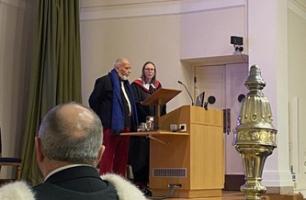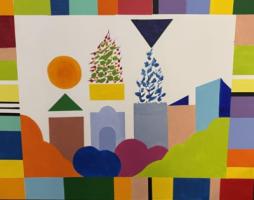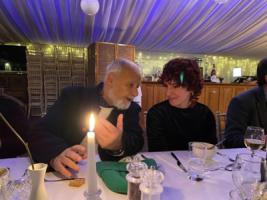Difficult times necessitate literature. This was the resounding conclusion of Tahar Benjelloun’s 2025 Zaharoff lecture, delivered at the Taylor Institution on January 30th.[1] Born in 1944, Benjelloun is a French Moroccan novelist, essayist, journalist, poet, and painter. Although probably best known for his novels L’Enfant de sable (1985) and La Nuit sacrée (1987) – the latter won the prix Goncourt, making Bejelloun the first Moroccan author to be awarded this prestigious French literary prize – Benjelloun has also written extensively on the social realities of colonialism and racism. As per Professor Catriona Seth’s opening remarks, the author, representing both France and Morocco, has often been concerned with the representation of those ‘without a voice’ and the paradoxes of human experience.

Much like Benjelloun’s layered and poetic prose, his lecture was rich in imagery and (intertextual) references. Early on in his address, the author stated that his lecture would be about literature, but ‘pas que’; not only this. Indeed, in a relaxed and intimate tone, the Moroccan author took his audience on a voyage across literary and historical moments, people, disciplines, and philosophies. Intermixing anecdotes and critical observations—on art, literature, and politics. It felt as though the lecture hall was in conversation with Bejelloun, guided through the intricacies of his mind. In her closing remarks, Professor Catriona Seth described Benjelloun as allowing the audience into his ‘atelier’, his artist’s workshop. This was certainly an accurate characterisation of the evening.
The themes of the lecture were wide spanning. In drawing contrasts between his practice of painting and writing, Bejelloun emphasised that painting represents a search for light while literature narrates our world. Notably, he identified literature as accompanying violence, with the best and most lasting poems often being characterised by pain and suffering. Yet it was painting which offered the author hope, particularly when faced with the ‘silent distress’ of recent events in Gaza, of which the author ‘did not know how to speak’. Painting, in this case, provided both a source of solace and the possibility of expression tied to emotional processing, even without references to details or place names.

In discerning what makes literature valuable, or even worth reading, Benjelloun referenced the influence of literary greats, from Balzac to Flaubert, Faulkner to Calvino. Describing the power of Faulkner’s works, for instance, Benjelloun evoked that in speaking about the American South, Faulkner inadvertently related ‘the reality of my country’. Although Morocco remains, for Benjelloun, close to his heart as ‘the most beautiful country in the world’, it also happens to be that ‘with the most corruption’. It is this juxtaposition of (cultural/emotional) richness and (economic/structural) poverty, he said, which characterises the nation, in many ways encompassing the paradoxes central to much of Benjelloun’s work. In this sense, great literature, for the author, was that which acted as a witness for its times. It was not something one did to simply ‘pass the time’.
In conversation with Benjelloun over dinner, the author and I spoke about a variety of topics, from 1970s French feminism to travel and artistic process. We found perhaps surprising common ground through speaking Italian: this is my mother’s tongue, and a language he had acquired over years of visiting the country. Talking about where I should go in Morocco, we touched on Tangier, where the author grew up, and I recommended Only Lovers Left Alive, a Jim Jarmusch film featuring two vampire lovers in Tangier to him. When I asked the author if he was tired and if it was ever difficult to continue the creative process, he shook his head. The important thing was to not stop moving.

Difficult times necessitate literature, then, but literature also necessitates difficult times. If not for difficult times, Benjelloun concluded literature was at risk of being easy and produced for the sole purpose of being consumer friendly. The best writers—and by extension the best literature—have lived through some sort of tragedy. One is obliged or even forced to write, as it is no light-hearted endeavour. Talking about the advent of AI, the author expressed fear for a future in which political and technological power might rest in the hands of those who ‘hold literature in contempt’. Yet the author remained ultimately hopeful that a tool such as AI could represent progress rather than destruction, if held in humanist hands. After all, there is nothing worse than perfection: humanity is all about the ‘petites faiblesses’, the little weaknesses or shortcomings. The role of the writer, the painter, or artist thus lies in returning dignity to humanity. In the end, not only do we ‘need difficult times’, but we have always had them, and they are an essential part of human history.
Many thanks to Tahar Benjelloun, Prof. Catriona Seth (All Souls College), the Maison Française d’Oxford, the Moroccan embassy, and all those involved in making the evening possible.
[1] Though his works are generally published under the name ‘Ben Jelloun’ in two words, the author himself uses the spelling ‘Benjelloun’ as it appears on his official documents. We have adopted his spelling throughout.